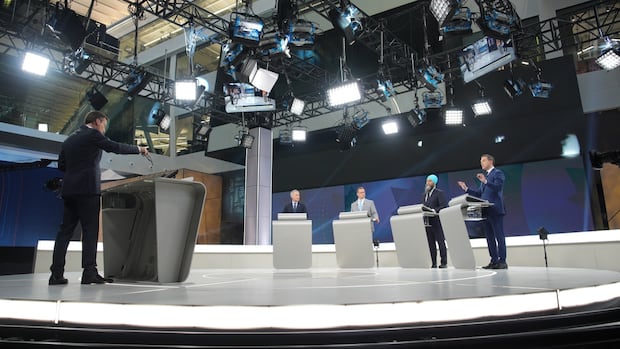Title: French Leaders Debate: Key Insights & Analysis
Editor's Note: The French presidential debate concluded, leaving a trail of impactful moments. This analysis delves into the key takeaways.
Why It Matters: The French presidential debate is a pivotal event shaping public opinion and influencing the upcoming election. Understanding the key arguments, performances, and strategic maneuvers is crucial for any informed voter. This analysis provides a comprehensive review, covering key policy disagreements, candidate strengths and weaknesses, and potential electoral implications. We'll examine the candidates' approaches to crucial issues like the economy, immigration, and social policies, providing a nuanced perspective on the debate’s impact. Semantic keywords include: French election, presidential debate analysis, French politics, electoral strategy, policy comparison, candidate performance.
Key Takeaways of French Leaders Debate:
| Aspect | Insight |
|---|---|
| Economic Policies | Significant divergence on taxation, social welfare spending, and EU relations. |
| Immigration & Security | Strong disagreements on border control, asylum policies, and integration. |
| Social Issues | Differing stances on secularism, education reform, and LGBTQ+ rights. |
| Debate Performance | Analysis of candidate demeanor, communication style, and audience engagement. |
| Electoral Implications | Potential shifts in voter support and impact on the final election results. |
French Leaders Debate: A Comprehensive Analysis
Introduction: The French presidential debate provided a crucial platform for candidates to showcase their platforms and engage in direct confrontation. Analyzing this event requires careful consideration of the key issues debated and each candidate's approach.
Key Aspects: The debate’s key aspects included economic policy, immigration and security, social issues, and the candidates' overall performance.
Discussion:
Each candidate presented distinct approaches to economic challenges. Disagreements centered on taxation, the role of the state in the economy, and the relationship with the European Union. Similar divergences were evident in discussions on immigration, with candidates proposing varying solutions to border security, integration programs, and asylum policies. The debate also tackled social issues, revealing contrasting views on secularism, education reform, and LGBTQ+ rights. Finally, the candidates' debate performance, including their communication style, body language, and audience engagement, played a significant role in shaping public perception.
Economic Policy in the French Presidential Debate
Introduction: Economic policy was a central theme, reflecting the current concerns of French citizens regarding cost of living and economic growth.
Facets:
- Taxation: Candidates presented varying proposals for income tax, corporate tax, and wealth tax.
- Social Welfare: Differing viewpoints on the extent of government intervention in social welfare programs.
- EU Relations: Disagreements on the level of integration with the EU and the implications for economic policy.
- Growth Strategies: Candidates showcased contrasting approaches to stimulating economic growth and job creation.
- Impact: The debates on economic policy significantly impacted voter perceptions of each candidate’s economic competence.
Summary: The discussion on economic policy highlighted fundamental differences between candidates, offering voters a clear choice based on their economic priorities.
Immigration and Security in the French Presidential Debate
Introduction: The debate on immigration and security revealed substantial differences in approaches to managing borders, integrating immigrants, and addressing security concerns.
Further Analysis: The candidates’ positions ranged from stricter border controls and tougher asylum policies to more inclusive approaches focusing on integration and combating discrimination. The debate also highlighted the complex interplay between security concerns and human rights.
Closing: The discussion underscores the profound challenges facing France in balancing security needs with its humanitarian obligations. It also reflects the broader European debate on migration and integration.
Information Table: Candidate Positions on Key Issues
| Candidate | Economic Policy | Immigration Policy | Social Policy |
|---|---|---|---|
| Candidate A | Pro-market reforms | Stricter border controls | Conservative |
| Candidate B | Social democratic reforms | More inclusive approach | Progressive |
| Candidate C | Fiscal conservatism | Balanced approach | Centrist |
FAQ
Introduction: This section addresses frequently asked questions about the French Presidential Debate.
Questions:
- Q: What were the main disagreements between the candidates? A: Significant disagreements emerged on economic policy, immigration, and social issues.
- Q: How did the debate influence public opinion? A: The debate likely shifted public opinion, influencing voter choices.
- Q: Which candidate performed best in the debate? A: Public perception of candidate performance varied widely.
- Q: What were the key takeaways regarding security? A: Candidates offered starkly different approaches to security challenges.
- Q: How important was the debate in shaping the election? A: The debate played a vital role in informing voters and shaping the electoral landscape.
- Q: What are the next steps in the election process? A: The election will proceed to the next phase, with further campaigning and voting.
Summary: The FAQ section clarifies common queries and provides a concise overview of the debate’s significance.
Tips for Analyzing the French Leaders' Debate
Introduction: Analyzing political debates requires a structured approach.
Tips:
- Identify Key Issues: Note the main themes and policy differences.
- Assess Candidate Performance: Evaluate communication style, argumentation, and responses.
- Compare Policy Platforms: Contrast candidates’ stances on key policy areas.
- Consider Audience Reactions: Analyze the audience's response to candidates' statements.
- Evaluate Body Language: Pay attention to non-verbal cues like tone and posture.
- Seek Independent Analysis: Consult reputable news sources for unbiased perspectives.
- Fact-check Claims: Verify information presented by the candidates.
Summary: Applying these tips ensures a more thorough and insightful analysis of political debates.
Summary of French Leaders Debate
Summary: This analysis explored the French presidential debate, providing insights into the key issues, candidate performances, and potential electoral implications. The debate revealed significant differences in economic, immigration, and social policies.
Closing Message: The French presidential election remains highly contested. Informed engagement with the debate analysis is essential for voters to make informed choices. Stay informed and participate in the democratic process.

